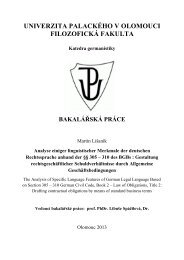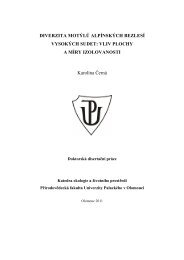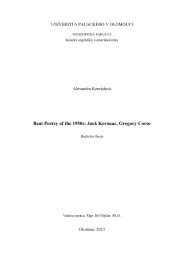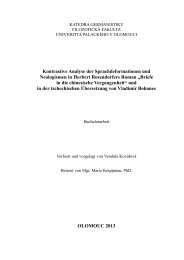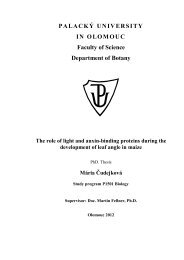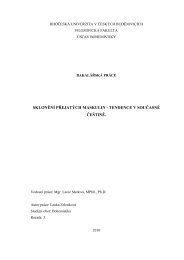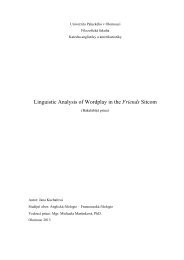thesis - Theses
thesis - Theses
thesis - Theses
You also want an ePaper? Increase the reach of your titles
YUMPU automatically turns print PDFs into web optimized ePapers that Google loves.
Resumé<br />
The goal of our <strong>thesis</strong> was to analyse the present situation of<br />
compounds in the Czech language. We excerpted the compounds<br />
from the two volumes of the dictionary of neologisms Nová<br />
slova v češtině 1 and 2. We excerpted only the words that were<br />
created by composition. Some of the words of the foreign origin<br />
could have been taken over from another language in this form<br />
but this usually cannot be determined exactly therefore we<br />
treated these words the same way as the others.<br />
Firstly we dealt with the position of composition in our language<br />
and its current status. We found out that composition is<br />
becoming frequent mean of forming new words together with<br />
derivation. Although derivation is still the main mean in Czech<br />
word formation, composition is gaining more importance especially<br />
because of the influence of English.<br />
In the part dealing with the structure of new compounds we<br />
showed that there are also compounds made of three components<br />
and there are not so rare as it might seem. We also analysed<br />
some of the productive new ways of forming new compounds as<br />
formation with prefix and suffix-like parts called prefixoids and<br />
suffixoids or with components e-, i-, m-. These means come to<br />
Czech also from English and the influence of prefixoids and suffixoids<br />
is so significant that there are also new Czech components<br />
of this type. The components e-, i-, m- are related to the Internet<br />
and new computer and other technologies therefore we<br />
can expect further productivity of this type of formation.<br />
When studying the origin of the new compounds we found<br />
out that the foreign components are more productive than the<br />
Czech ones and therefore together with the new way of forming<br />
new words there are also new components coming to Czech<br />
from English. These components are usually of Greek or Latin<br />
origin and they are international. But they come to Czech via<br />
73



